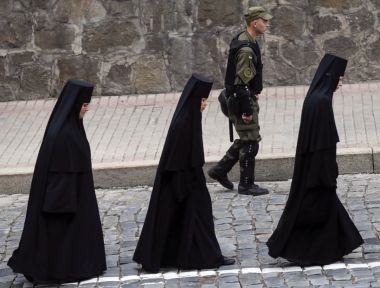Nun 'strangled and beaten', priest murdered in Ukraine killings

An elderly nun found dead in her Kiev apartment the same day that a priest died of gunshot wounds may have been tortured prior to her killing, local reports suggest.
Russia's Interfax news agency said that 62-year-old Sister Alevtina's body was found on July 29 with her hands tied and showing "traces of torture". She was a nun at Kiev's Florivsky Convent.
Alevtina's mentor sister, Maria-Agafia, told the Kyiv Post that she had been shown photos from the crime scene. "Her killer was so cruel. He strangled and beat her. The burns from the cigarette stubs were all over her body. Her hands were tied," she said.
She also claimed that Alevtina's murderer had tried to force the nun to sign over her city apartment.
She had bequeathed the flat to a nephew in her will, Mother Superior of the convent Antonia Filkya said, and her killer may have been someone "very unsatisfied with her decision".
Also on Wednesday, Father Roman Nikolayev, 40, of the Church of St Tatiana died after being shot in the head last Sunday. He was found by a neighbour near his house in Kiev's Obolon district.
Head of the Russian Orthodox Church Patriarch Kirill has condemned the murders. "It is especially alarming that these outrageous murders of a priest and a nun were committed at the very time when seizures of churches of the Ukrainian Orthodox Church continue, when false charges and threats are voiced in the public space concerning its clergy, monks and laity," he said in a statement.
Patriarch Kirill called for "an impartial and thorough investigation of the offences" and for the perpetrators to be held to account.
Police say they are investigating the crimes independently. "The investigation does not connect these episodes," spokeswoman Iryna Levchenko told the Kyiv Post.
"They are in fact very different. Two separate investigation teams are working on them. But we are exploring different versions."
A spokesman for the Ukrainian Orthodox Church of the Moscow Patriarchate told the Post that it was unlikely the murders could be connected on religious grounds.











